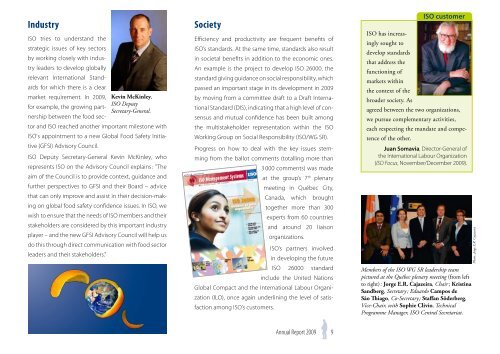annual_report_2009
You also want an ePaper? Increase the reach of your titles
YUMPU automatically turns print PDFs into web optimized ePapers that Google loves.
Industry<br />
ISO tries to understand the<br />
strategic issues of key sectors<br />
by working closely with industry<br />
leaders to develop globally<br />
relevant International Standards<br />
for which there is a clear<br />
market requirement. In <strong>2009</strong>, Kevin McKinley,<br />
ISO Deputy<br />
for example, the growing partnership<br />
between the food sec-<br />
Secretary-General.<br />
tor and ISO reached another important milestone with<br />
ISO's appointment to a new Global Food Safety Initiative<br />
(GFSI) Advisory Council.<br />
ISO Deputy Secretary-General Kevin McKinley, who<br />
represents ISO on the Advisory Council explains : "The<br />
aim of the Council is to provide context, guidance and<br />
further perspectives to GFSI and their Board – advice<br />
that can only improve and assist in their decision-making<br />
on global food safety confidence issues. In ISO, we<br />
wish to ensure that the needs of ISO members and their<br />
stakeholders are considered by this important industry<br />
player – and the new GFSI Advisory Council will help us<br />
do this through direct communication with food sector<br />
leaders and their stakeholders."<br />
Society<br />
Efficiency and productivity are frequent benefits of<br />
ISO’s standards. At the same time, standards also result<br />
in societal benefits in addition to the economic ones.<br />
An example is the project to develop ISO 26000, the<br />
standard giving guidance on social responsibility, which<br />
passed an important stage in its development in <strong>2009</strong><br />
by moving from a committee draft to a Draft International<br />
Standard (DIS), indicating that a high level of consensus<br />
and mutual confidence has been built among<br />
the multistakeholder representation within the ISO<br />
Working Group on Social Responsibility (ISO/WG SR).<br />
Progress on how to deal with the key issues stemming<br />
from the ballot comments (totalling more than<br />
3 000 comments) was made<br />
at the group’s 7 th plenary<br />
meeting in Québec City,<br />
Canada, which brought<br />
together more than 300<br />
experts from 60 countries<br />
and around 20 liaison<br />
organizations.<br />
ISO’s partners involved<br />
in developing the future<br />
ISO 26000 standard<br />
include the United Nations<br />
Global Compact and the International Labour Organization<br />
(ILO), once again underlining the level of satisfaction<br />
among ISO’s customers.<br />
ISO customer<br />
ISO has increasingly<br />
sought to<br />
develop standards<br />
that address the<br />
functioning of<br />
markets within<br />
the context of the<br />
broader society. As<br />
agreed between the two organizations,<br />
we pursue complementary activities,<br />
each respecting the mandate and competence<br />
of the other.<br />
Juan Somavia, Director-General of<br />
the International Labour Organization<br />
(ISO Focus, November/December <strong>2009</strong>).<br />
Members of the ISO WG SR leadership team<br />
pictured at the Québec plenary meeting (from left<br />
to right) : Jorge E.R. Cajazeira, Chair ; Kristina<br />
Sandberg, Secretary ; Eduardo Campos de<br />
São Thiago, Co-Secretary ; Staffan Söderberg,<br />
Vice-Chair, with Sophie Clivio, Technical<br />
Programme Manager, ISO Central Secretariat.<br />
Photo : Jorge E.R. Cajazeira<br />
Annual Report <strong>2009</strong><br />
9


